UNIT1:Myself and My Community

My goals
After studying this unit, I will be able to:
⦿ Use: ‘can’, ‘may’, ‘have to’, ‘paragraphs’, ‘more’, ‘fewer’, ‘no’.
⦿ Describe leisure time activities, internet use, reading habits, facilities
in the community, the structure of local government and the provision
of social services, in speech and writing.
⦿ Compare facilities, jobs and transport in town and country in speech
and writing.
⦿ Show readiness to execute my role and responsibility as a communitymember.
A: Listening and Speaking
Describing hobbies and leisure time


Myself and My Community
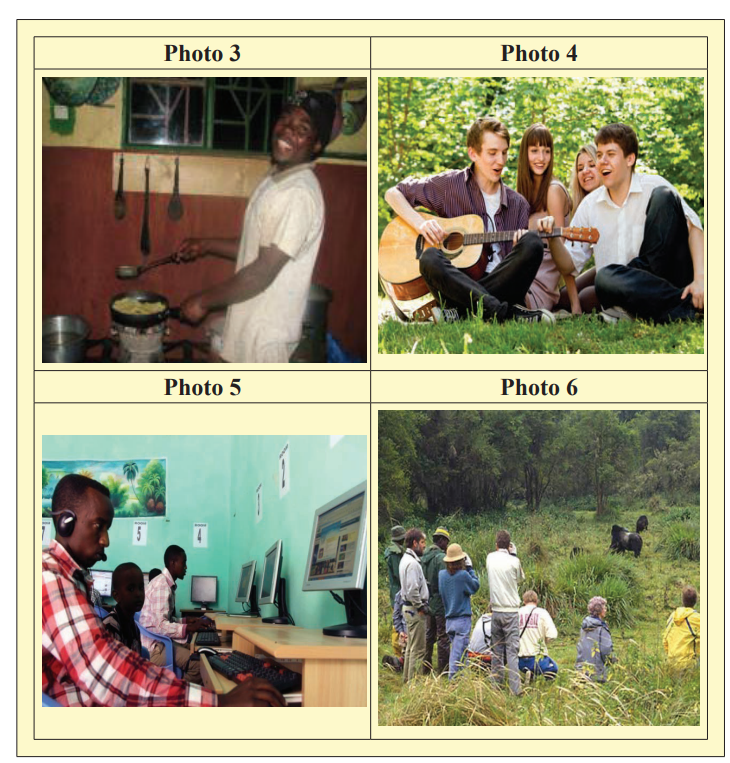
Activity 3
Now answer these questions.
1. Describe the activities taking place in photos 1-6.
2. Identify which of the activities in the photos you think are done
as hobbies and those that are done as leisure activities.
3. In your opinion, do you think hobbies and leisure activities are the
same? Use the photographs to explain your answer.
4. Explain the importance of hobbies and leisure time activities in
our lives.
Recounting activitiesActivity 1
Discussion
1. Think of the activities you did over the weekend. Narrate them
to your fellow members. Now write an essay or a composition
describing those activities. Exchange your compositions with afriend to read through and compare the activities.
Describing internet activity
Activity 1
1. Use the internet from your school computer laboratory, if there
is one. If your school does not have one, visit an internet café
near your school. An internet café is a place where people get the
internet at a fee. It is also possible that some people have an internet
connection in their homes. If you have a friend who has it at home,
you can request him or her to let you use it to search the web (a
source of information on the internet about a particular subject,
published by an individual or organisation) for information.
2. Think about a topic that interests you. It could be about football,
culture, music, nature, and others. Download it in Microsoft Word
and edit the details, including the photographs and the content.Send it as an e-mail to a classmate.
Activity 2
1. Discuss with classmates. In turns, share the leisure activities that
people in your community engage in.
After class, interact with some of the people in your communityto find out why they prefer particular leisure activities to others.
Activity 3
Discussion
Think about this proverb!
“All work without play makes Jack a dull boy”.
(a) Share with a classmate what you understand by this proverb.
(b) Do you agree with this proverb? Give reasons for your answer.
(c) Explain the problems likely to be caused by a lot of leisure.
(d) How would you advise your young brother or sister to usehis or her leisure time?
B: Reading and Comprehension
Describing reading habitsActivity 1
1. Carefully study the photographs below.

(a) What do you think the people could be reading in each
photo? Give reasons.
(b) Explain the similarities and differences between photo B
and the rest of the photographs.
(c) Why do you think people engage in the kind of reading
shown in photo C?
(d) How helpful is the kind of reading shown in photo D?
Activity 2
Discussion
1. Share your views about these questions.
(a) Tell your class members what you normally like reading
about. Give reasons for your opinion.
(b) What do people in your community like to read about?
(c) Compare what you read at your school and what is read by
people in your community.
(d) The comparison in (c) above will bring out three issues:
(i) things read by people in the community but not read
at your school.
(ii) things read at your school but not read by people in
the community.
(iii) things read both by people in the community and also
read at your school.2. Give reasons for each situation above.
Reading extracts from Literature
Activity 1
Discussion
1. We have discussed reading as a form of spending our leisure time.
Tell your class members the books or magazines you have ever read.
2. Describe a memorable story you have ever enjoyed reading.
3. Stories are classfied as: fiction, comedy, drama, horror, non-fiction,
romance, satire, adventure, tragedy, tragi-comedy and fantasy. Find
out what each story type encompasses. Which of these stories do
you normally read? Explain your preference for those stories.
Activity 3
Read and enjoy the story
My father’s family name being Pirrip, and my Christian name Philip, my
infant tongue could make of both names nothing longer or more explicit
than Pip. So, I called myself Pip, and came to be called Pip.
I give Pirrip as my father’s family name, on the authority of his tombstone
and my sister - Mrs. Joe Gargery, who married the blacksmith. As I
never saw my father or my mother, and never saw any likeness of either
of them (for their days were long before the days of photographs), my
first fancies regarding what they were like, were unreasonably derived
from their tombstones. The shape of the letters on my father’s, gave
me an odd idea that he was a square, stout, dark man, with curly black
hair. From the character and turn of the inscription, “Also Georgiana
Wife of the Above,” I drew a childish conclusion that my mother was
freckled and sickly. To five little stone lozenges, each about a foot and
a half long, which were arranged in a neat row beside their grave, and
were sacred to the memory of five little brothers of mine - who gave
up trying to get a living, exceedingly early in that universal struggle - I
am indebted for a belief I religiously entertained that they had all been
born on their backs with their hands in their trouser-pockets, and had
never taken them out in this state of existence.
Ours was the marsh country, down by the river, within, as the river wound,
twenty miles of the sea. My first most vivid and broad impression of the
identity of things, seems to me to have been gained on a memorable raw
afternoon towards evening. At such a time I found out for certain, that this
bleak place overgrown with nettles was the churchyard; and that Philip
Pirrip, late of this parish, and also Georgiana wife of the above, were
dead and buried; and that Alexander, Bartholomew, Abraham, Tobias,
and Roger, infant children of the aforesaid, were also dead and buried;
and that the dark flat wilderness beyond the churchyard, intersected
with dykes and mounds and gates, with scattered cattle feeding on it,
was the marshes; and that the low leaden line beyond, was the river;
and that the distant savage lair from which the wind was rushing, was
the sea; and that the small bundle of shivers growing afraid of it all and
beginning to cry, was Pip.
“Hold your noise!” cried a terrible voice, as a man started up from among
the graves at the side of the church porch. “Keep still, you little devil,or I’ll cut your throat!”
A fearful man, all in coarse grey, with a great iron on his leg. A man
with no hat, and with broken shoes, and with an old rag tied round his
head. A man who had been soaked in water, and smothered in mud,
and lamed by stones, and cut by flints, and stung by nettles, and torn by
briars; who limped, and shivered, and glared and growled; and whose
teeth chattered in his head as he seized me by the chin.
“O! Don’t cut my throat, sir,” I pleaded in terror. “Pray don’t do it, sir.”
“Tell us your name!” said the man. “Quick!”
“Pip, sir.”
“Once more,” said the man, staring at me. “Give it mouth!”
“Pip. Pip, sir.”
“Show us where you live,” said the man. “Point out the place!”
I pointed to where our village lay, on the flat in-shore among
the aldertrees and pollards, a mile or more from the church.
The man, after looking at me for a moment, turned me upside down, and
emptied my pockets. There was nothing in them but a piece of bread.
When the church came to itself - for he was so sudden and strong that
he made it go head over heels before me, and I saw the steeple under
my feet - when the church came to itself, I say, I was seated on a high
tombstone, trembling, while he ate the bread ravenously. “You young
dog,” said the man, licking his lips, “what fat cheeks you ha’ got.” I
believe they were fat, though I was at that time undersized for my years,
and not strong.
“Darn me if I couldn’t eat ’em,” said the man, with a threatening shake
of his head, “and if I han’t half a mind to’t!”
I earnestly expressed my hope that he wouldn’t, and held tighter to the
tombstone on which he had put me; partly, to keep myself upon it; partly,
to keep myself from crying.
“Now lookee here!” said the man. “Where’s your mother?”
“There, sir!” said I.
He started, made a short run, and stopped and looked over his shoulder.
“There, sir!” I timidly explained. “Also Georgiana. That’s my mother.”
“Oh!” said he, coming back. “And is that your father alonger your
mother?”
“Yes, sir,” said I; “him too; late of this parish.”
“Ha!” he muttered then, considering. “Who d’ye live with - supposin’
you’re kindly let to live, which I han’t made up my mind about?”
“My sister, sir - Mrs. Joe Gargery - wife of Joe Gargery, the blacksmith, sir.”
“Blacksmith, eh?” said he. And looked down at his leg.
After darkly looking at his leg and me several times, he came closer to
my tombstone, took me by both arms, and tilted me back as far as he
could hold me; so that his eyes looked most powerfully down into mine,
and mine looked most helplessly up into his.
“Now lookee here,” he said, “the question being whether you’re to be
let to live. You know what a file is?”
“Yes, sir.”
“And you know what wittles is?”
“Yes, sir.”
After each question he tilted me over a little more, so as to give me a
greater sense of helplessness and danger.
“You get me a file.” He tilted me again. “And you get me wittles.” He
tilted me again. “You bring’ em both to me.” He tilted me again. “Or
I’ll have your heart and liver out.” He tilted me again.
I was dreadfully frightened, and so giddy that I clung to him with both
hands, and said, “If you would kindly please to let me keep upright, sir,
perhaps I shouldn’t be sick, and perhaps I could attend more.”
He gave me a most tremendous dip and roll, so that the church jumped
over its own weather-cock. Then, he held me by the arms, in an upright
position on the top of the stone, and went on in these fearful terms:
“You bring me, to-morrow morning early, that file and them wittles. You
bring the lot to me, at that old Battery over yonder. You do it, and you
never dare to say a word or dare to make a sign concerning your having
seen such a person as me, or any person sumever, and you shall be let
to live. You fail, or you go from my words in any partickler, no matter
how small it is, and your heart and your liver shall be tore out, roasted
and ate. Now, I ain’t alone, as you may think I am. There’s a young man
hid with me, in comparison with which young man I am a Angel. That
young man hears the words I speak.
“That young man has a secret way pecooliar to himself, of getting at a
boy, and at his heart, and at his liver. It is in wain for a boy to attempt
to hide himself from that young man. A boy may lock his door, may be
warm in bed, may tuck himself up, may draw the clothes over his head,
may think himself comfortable and safe, but that young man will softlycreep and creep his way to him and tear him open.
“I am a-keeping that young man from harming of you at the present
moment, with great difficulty. I find it wery hard to hold that young man
off of your inside. Now, what do you say?”
I said that I would get him the file, and I would get him what broken
bits of food I could, and I would come to him at the Battery, early in
the morning.
“Say Lord strike you dead if you don’t!” said the man.
I said so, and he took me down.
“Now,” he pursued, “you remember what you’ve undertook, and you
remember that young man, and you get home!”
“Goo-good night, sir,” I faltered.
“Much of that!” said he, glancing about him over the cold wet flat. “I
wish I was a frog. Or a eel!”
At the same time, he hugged his shuddering body in both his arms -
clasping himself, as if to hold himself together - and limped towards the
low church wall. As I saw him go, picking his way among the nettles,
and among the brambles that bound the green mounds, he looked in my
young eyes as if he were eluding the hands of the dead people, stretching
up cautiously out of their graves, to get a twist upon his ankle and pull
him in.
When he came to the low church wall, he got over it, like a man whose
legs were numbed and stiff, and then turned round to look for me. When
I saw him turning, I set my face towards home, and made the best use
of my legs. But presently I looked over my shoulder, and saw him
going on again towards the river, still hugging himself in both arms,
and picking his way with his sore feet among the great stones dropped
into the marshes here and there, for stepping-places when the rains were
heavy, or the tide was in.
The marshes were just a long black horizontal line then, as I stopped to
look after him; and the river was just another horizontal line, not nearly
so broad nor yet so black; and the sky was just a row of long angry redlines and dense black lines intermixed
On the edge of the river I could faintly make out the only two black
things in all the prospect that seemed to be standing upright; one of these
was the beacon by which the sailors steered - like an unhooked cask
upon a pole - an ugly thing when you were near it; the other a gibbet,
with some chains hanging to it which had once held a pirate. The man
was limping on towards this latter, as if he were the pirate come to life,
and come down, and going back to hook himself up again. It gave me a
terrible turn when I thought so; and as I saw the cattle lifting their heads
to gaze after him, I wondered whether they thought so too. I looked all
round for the horrible young man, and could see no signs of him. But,
now I was frightened again, and ran home without stopping.(Source: Extract from “Great Expectations” by Charles Dickens)
Activity 4
1. Visit your library and borrow the novel ‘The Great Expectations’
written by Charles Dickens. Read it. Discuss the plot of the story.
Explain the challenges Pip faced and how he struggled to overcome
them.
2. Language can be categorised as formal or informal or slang. Use
the dictionary to find out the meanings of these terms.
3. The fierce man on page 10-11 uses slang. Identify the slang words
and provide their formal equivalent words. In literature all thesetypes of language are permitted for use.
DiscussionActivity 5
Think of a real–life situation where the story of Pip applied to your life.Discuss the situation with your friends.
Describing facilities in the communityActivity 1
Work
The table below shows facilities that are normally found in communities,
whether in towns and cities or in the countryside. Study the table
carefully. Fill in the missing information. Compare your answers with
other classmates.
(i) Use a tick (√ ) to show the facilities that exist in your
locality.
(ii) For those that are not found in your locality, show
them using a cross (×).
(iii) In the third column, indicate the importance of eachfacility to people’s lives.
Activity 2
Discussion
(a) Have you ever been to both the countryside and the city?
(b) Briefly describe the differences between the two places.
(c) Which of the two places would you prefer to live in? Givereasons for your choice.
Activity 3
Read the following passages
My country home
I live in a small village with my family. There is a narrow murram road
connecting my village with the nearby town. Most people walk or ride
bicycles to the town. There are fewer facilities compared to the city. We
have a health centre and a primary school in our community. However the
health centre does not have enough medicine. The primary school lacks
enough teachers and scholastic materials for proper studying. People
collect water from streams and wells or from boreholes. Shopping is
done at the nearby trading centre but many essential commodities are
often not there. People have to travel to town to shop for some essential
commodities. There is no post office, so people can only send letters by
travelling to town to post them. There may be people who want to bank
their money, but there is no bank in our village. In my village there ismore land than in the city which can be used for farming and other uses.
It is also easy to get cheap food in my village. Many people in the village
are farmers. They earn money by selling food. The incomes are lower
than those in the town but the cost of things is lower than that in the city.
My city home
I was born and brought up in Kigali City. The roads are good and are
connected to almost every part of the country. There is a large population
and there are many vehicles to transport people and goods. There are
many hospitals and schools with very good facilities. The buildings are
big, tall and amazing to look at. Most of the country’s administrative
offices and head offices of government departments and organisations
are found here.
It is also where we find the National Bank of Rwanda and head office
of the University of Rwanda. There are a number of industries where
people are employed. The people looking for jobs are usually more than
the available jobs. Others are government workers and they are paid
salaries. Incomes are higher but things are more expensive than in the
village. Many people have piped clean water supplied to their houses
and electricity. Shopping is made easy by the numerous supermarkets
and shops found all over the city. There are also various entertainment
centres. People often travel using their own vehicles or they use publictransport such as buses or taxis.
After reading the two passages, answer these questions
(a) Why do you think there is a large population in the city?
(b) Explain what makes the countryside a good place to live in.
(c) In your opinion, what are the problems faced by people
living in towns?
(d) In your opinion, where is life more challenging; in the townor in the village? Why?
Comparing facilities in the country/town
Activity 1
Discussion
(a) The photos (1 – 16) show facilities in the countryside andin town. Study them carefully.



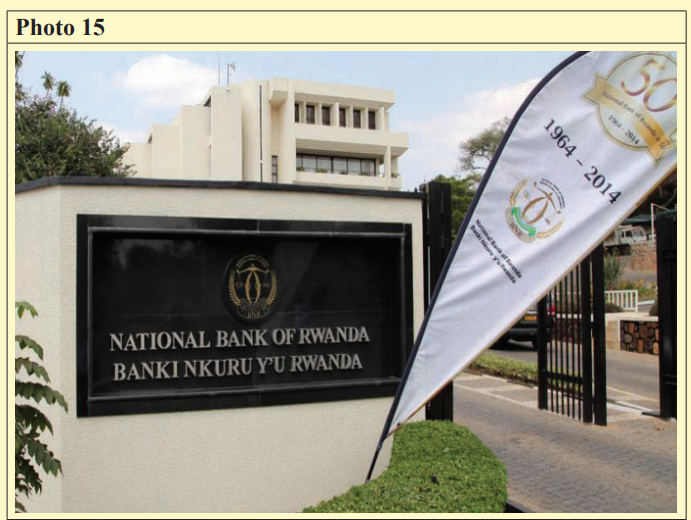
Activity 2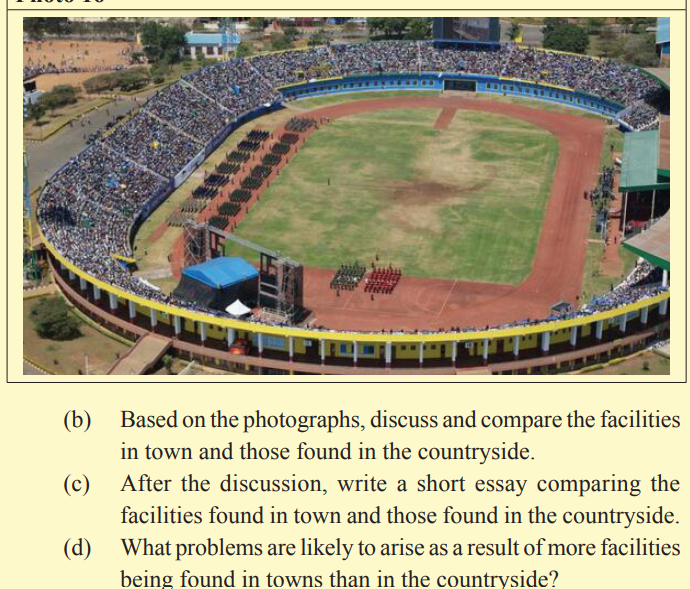
Debate the motion: Town life is better than village life. What would
be your points supporting the motion? What would be your arguments
against the motion?
Comparing jobs in the country/ townActivity 1
Discussion
Study the photographs and describe what is taking place. Where is onelikely to find the jobs being done in the photograph?
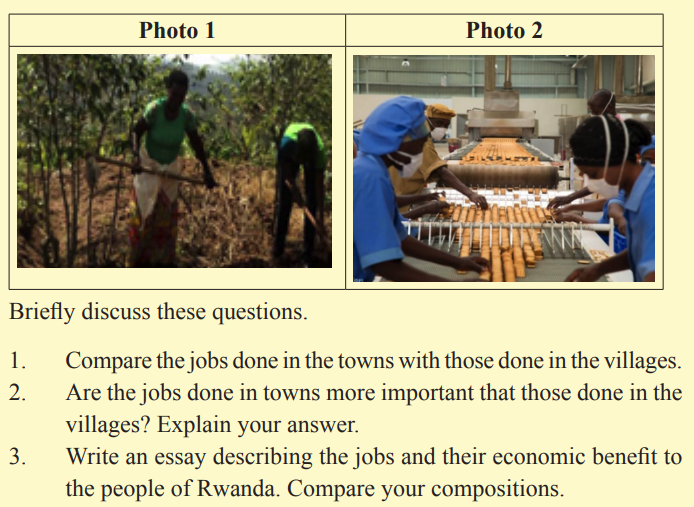
Comparing transport in the country/ town
Activity 1
Discussion
Discuss these questions:
(a) How do people normally travel in your community?
(b) Discuss the transport means available in your community.
(c) Explain the challenges your community members face in
terms of transportation of themselves and their goods.
Choose a secretary to present your findings to the class for comparison
and further discussion.
Describing social services
Activity 1
(a) Name the kind of services provided by the government to
your community. Explain the role each of them plays in
people’s lives.
(b) Explain how the government manages to get money to use
in providing services to the people.
(c) Apart from the government, non-governmental organisations
can also provide services to communities. Which of such
organisations are found in your community? Explain the
kind of services they provide.
(d) How do these organisations manage to get money to be ableto provide services to the community?
Activity 2
Read this text carefully
The provision of social services is done by the government or nongovernmental organisations for the benefit of the community. These
include education, medical care, housing, food, roads, welfare and
poverty reduction programmes.
In Rwanda, the Ministry of Health is committed to improving the health
of the Rwandan people by strengthening the quality of health care and
providing access to treatment through the health insurance scheme
(Mutuelles de Santé).
The ministry also launched a community-based insurance scheme in
the country. The scheme covers all services and medicine provided by
the health centres to sick people as well as ambulance transport to the
hospital.
The beneficiaries are required to contribute to the scheme. However, the
government pays for the very poor people as well as other vulnerable
groups who cannot manage to contribute to the insurance scheme.
Through the “Girinka programme”, the government has been able to
reduce poverty and child malnutrition among poor rural families. This
programme also known as “one cow per poor family” is a system by
which each poor family is given one cow. It is aimed at improving their
living conditions and giving them hope for survival.
This programme combines livestock and crop farming. The cows produce
milk which is a source of nutrition for the family as well as income from
the sale of surplus milk. The cows also provide organic manure used
to fertilise the soil. As a result, this improves their livelihood through
a more nutritious and balanced diet from milk, increased agricultural
output through higher soil fertility and higher incomes
The Rwandan government introduced the national human settlement
policy, which came to be known as “Imidugudu”, in December 1996.
This policy focused on group settlement as a way of solving the problem
of land scarcity. It aimed at establishing specific residential areas in each
village in efforts to promote proper land utilisation and the provision
of basic services.
With the help of United Nations agencies such as the United Nations
High Commissioner for Refugees (UNHCR) and a number of
nongovernmental organistions such as PREFER (Poverty Reduction
Education Family Empowerment), the government then began building
homes for the hundreds of thousands of people who were returning from
exile after the war. Most beneficiaries were the vulnerable survivors of
the genocide, many of whom were widows and orphans.
The programme since 1997 has been modified and extended to help
the rural people more generally. This is aimed at bringing scattered
households closer together in villages. The concept of Imidugudu was
seen to offer many advantages to the population because of the fact that
people would be living together in defined areas. This would make it
much easier and more efficient for the government to provide social and
economic services to the population.
Under this programme, the government focuses on the provision of
services such as health, education, water and sanitation. The government
also aims at providing roads and other communication networks,
agricultural extension services and easy reach to markets. This wouldeventually encourage development in these locations.
Questions
1. After reading, make notes on the text using topic headings of the
issues talked about in the text.
2. Briefly talk about other programmes the government has put inplace to help in the provision of social services to the people.
Activity 3
Activity - Research
The table below shows a number of agencies involved in the provision
of social services to Rwandan communities. You are advised to use the
library and the internet to fill in the table by stating the kind of services
provided by each provider and their source of funding. An example hasbeen given to assist you in completing the table.
Activity 4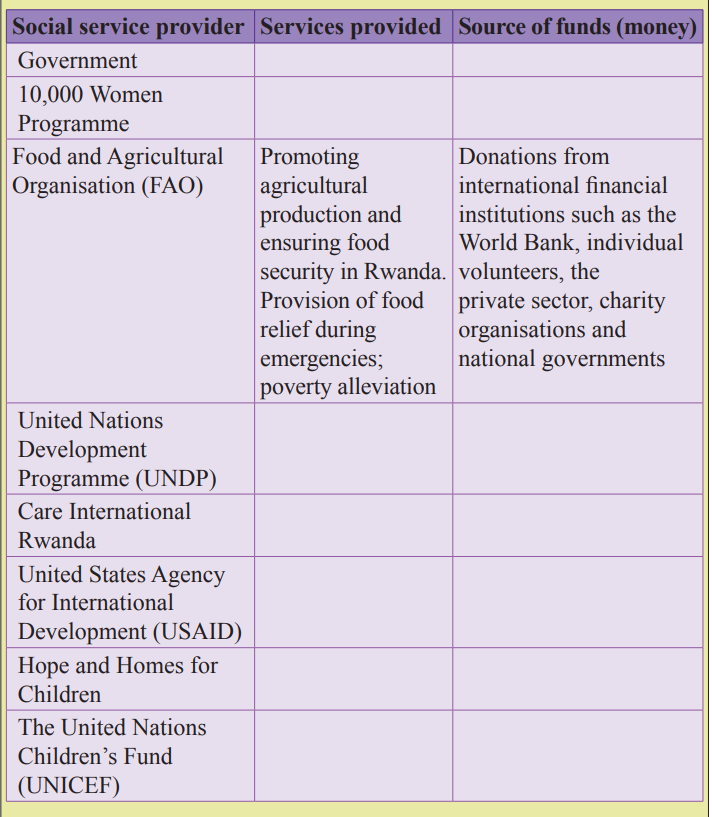
By now you should have noticed that provision of social services can
be carried out by the government or non-governmental organisations
or private institutions which supplement the government’s efforts. In
order for social services to reach the ordinary or common people, the
government depends on local councils in communities to deliver the
services. Therefore, the role of local council officials is very important
in service delivery.
(a) Your school will invite an official from the local council to
come and talk to you about social service delivery. Listen
to him or her.
(b) You will have the opportunity to share ideas with the official.
(c) You will also ask questions about the provision of social
services in order to gain more knowledge about social
service providers, the kind of services they provide and howthey fund their activities
Describing local government processesActivity 1
(a) How are local leaders in your community elected?
(b) Explain some of the duties of local leaders in your
community.
(c) Is it important for the people in a community to get involved
in administrative processes of their communities? Give
reasons for your answer.
(d) Describe some of the administrative processes that the
people of your community participate in.
Activity 2
(a) Your school will invite an official from the local council to
talk to you about the organisational / administrative structure
of local government and the importance of local government
processes such as voting and council meetings.
(b) You will have the opportunity to share ideas with the official.
(c) You should ask questions about the how administrative
structures are formed right from the lowest level in village
communities to the national level.
Talking about responsibilities
Activity 1
Discussion
(a) Carefully study the diagram below showing the organisational
/ administrative structure of a district local government inRwanda.
(b) Draw a similar diagram showing the administrative structure
of your school. You may need to consult your head teacher
or any other teacher to guide you.(c) Compare your work for further discussion.
Activity 2
In Activity 1 above, you were shown the administrative structure of
a district local government in Rwanda. The diagram below shows
the process of service provision under the district local government
structure through different departments. Study it carefully and answerthe questions that follow.
(a) According to the diagram above, the provision of social
services starts with planning and budgeting. Why do you
think this is necessary?
(b) Of what importance are sport, leisure and culture in people’s
lives?
(c) Explain the steps taken by the local government to promote
agriculture in your area.
(d) Why do you think collecting taxes is necessary in theprovision of services?
Activity 3
Dialogue
Practice this dialogue before answering the questions that follow.
Gakwaya: Good afternoon, Keza.
Keza: Good afternoon, Gakwaya.
Gakwaya: Yesterday, I saw you walking across the road. Where
were you coming from?
Keza: Oh! I was coming from the District Council headquarters.
Gakwaya: What had you gone to do there?
Keza: I had gone to attend a discussion organised by the Mayor
involving other government officials.
Gakwaya: What was it about?
Keza: It was about sensitising people about the duties and
responsibilities of the government and the citizens
themselves towards the development of their communities
and Rwanda as a whole.
Gakwaya: It must have been very interesting. I wish I had known.
I would also have attended.
Keza: Sure, yes; it was not only interesting but also quite educative!
Gakwaya: Would you mind sharing with me what you learnt from there?
Keza: I don’t mind at all. First and foremost, we were informed
that we as citizens have the responsibility of keeping our
environment clean. We also have the duty to protect,
safeguard and promote the environment.
Gakwaya: But I thought that it is government that is responsible for
protecting and safeguarding the environment.
Keza: The environment includes all the things around us,
including the homes where we live. So some parts of the
environment require our personal effort to protect and
safeguard them. We don’t always have to wait for the
government to look after our homes
Gakwaya: That is correct. But what about our environment such
as forests and wetlands? Who is responsible for their
protection?
Keza: Well, the government plays a very big role in protecting
these. But we as citizens also have our part to play. For
example, we can protect our forests by not cutting down
trees. Wetlands such as swamps can be protected by not
draining them.
Gakwaya: What are other roles and responsibilities of the
government?
Keza: The government is responsible for providing health care
to the citizens and other social services and necessities
such as security, clean water, schools and roads.
Gakwaya: Is there any role played by citizens in the promotion of
security of their communities and the country as a whole?
Keza: Definitely. Security is a very sensitive issue and so it can
be best promoted through the involvement of everyone.
All citizens have the duty to safeguard peace, security
and democracy; and to participate in the defence of their
motherland. Citizens also have the duty to participate in
the development of the country.
Gakwaya: You really gained a lot of knowledge and understanding.
Is there any chance that there will be such a discussion
in future? I would certainly attend.
Keza: Yes. There is going to be another one in one month’s
time. I will remind you one week before it takes place.
Gakwaya: I will be very grateful. Goodbye for now.Keza: Goodbye to you
Exercise
1. Other than the duties and responsibilities mentioned above, state
the other responsibilities of:(a) the government (b) the citizens
2. Explain the responsibilities of:
(a) parents
(b) children
3. (a) Why do you think it is not a good idea to encroach on wetlands?
(b) In which other ways can we ensure that our forests are not
destroyed?
4. Explain how citizens contribute towards the promotion of peace
and security in their country.
5. How does peace contribute to the development of your country?C: Writing
y Language structure
Activity 1
Gap filling
Complete these sentences using the words in the box below. A wordmay be used more than once.
can, may, have to
1. I …………..be at home before dark because there are many thieves
on the way.
2. Driving a vehicle ……… be dangerous if you are not well trained.
3. You …………….. go for the trip if you have the money to pay.
4. I ……….. not go to town tomorrow if it rains.
5. My son ………. speak three languages: English, French and Swahili.
6. The head teacher says we ……… enter the office now.
7. Peter ……… have forgotten his phone at home.
8. We …….. study hard if we want to pass examinations.
9. She …….. go back home early because her child is sick.10. You ………. carry your umbrella. It is likely to rain today.
Activity 2
Rearrange the following sentences and use them to write
a paragraph.
1. He is in my class and he is very bright.
2. I talked to my father since he works with an organisation that
sponsors children’s education.
3. I met him the next day and took him to our home.
4. One day I was going to school.
5. My father then agreed to talk to his bosses about the boy’s
problem.
6. He told me to bring the boy to our home.
7. I met a poor boy who looked miserable.
8. He told me that he loved to go to school, too.
9. After talking to him, my father sympathised with the boy’s
situation.10. Fortunately my father’s bosses accepted to pay the boy’s fees.
Activity 3
Multiple choice
Choose the correct answer from the alternatives given.
1. She has ……………...... friends than me.
(a) many (b) more (c) much
2. We saw ……………. people in Kigali City.
(a) more (b) much (c) many
3. Rudasingwa doesn’t have ……….. friends at school.
(a) many (b) more (c) much
4. There are ……… schools here than in my village.
(a) many (b) more (c) much
5. There are too ……….. questions in this exercise!
(a) many (b) much (c) very
6. I am sure I did not make ………… mistakes in the examination.
(some/any)
7. I have ………. money, so I will buy you lunch. (any/some)
8. That is very kind of you because I don’t have ………… money
on me. (some/any)
9. I went to the butchery but I did not buy …… meat. It was very
expensive. (some/any)
10. Do you have any food left? No, I do not have ……… (some/any)
11. There are ………… people here than in the centre of the city.
(less/fewer)
12. ………… children are studying French these days. (Less/Fewer)
13. There are ………. jobs than the number of people applying for
them. (less/fewer)
14. We closed the business because there were………… customers
than we had expected. (less/fewer)
15. We witness ……….. accidents these days because of tougher
laws. (less/fewer)
16. ..................... of the soldiers who went on patrol has come back.
(No/None)
17. ............................... of his friends would help him. (No/None)
18. Have you any newspapers? I am sorry, sir, but there are .............
left. (some/none)
19. She wanted some sugar but there was……… in the house. (no/
none)20. ..................of them has come back. (Some/None)
Practice exercise
1. Write a composition comparing a nearby town with your home village.If you live in a town, compare your home town with a nearby village.
Arrange the composition as follows:
Paragraph 1: How big is it? What is found there?
Paragraph 2: What good things are found where you live?
Paragraph 3: What problems are found there?
Paragraph 4: What changes would you like to see in your town or
village?
2. Read the following poem and answer the questions that followHome sweet home
Whether it be a bungalow
All built with red burnt bricks
Roofed with beams and iron sheets
With levelled floor all covered in tiles
Still it be my home sweet home
Whether it be a little hut
All walls smeared with mud and clay
Thatched with grass, straw and poles
With hard beaten earthen floor
Still it be my home sweet home(Ivan Tuhairwe 2016
Exercise
1. How many types of houses are described in the poem?
2. Compare the top covering of each house.
3. Point out one similarity of the houses.
4. Explain where these houses would most likely be found. Give
reasons for your view.5. Which of the houses would you prefer to stay in? Why?
